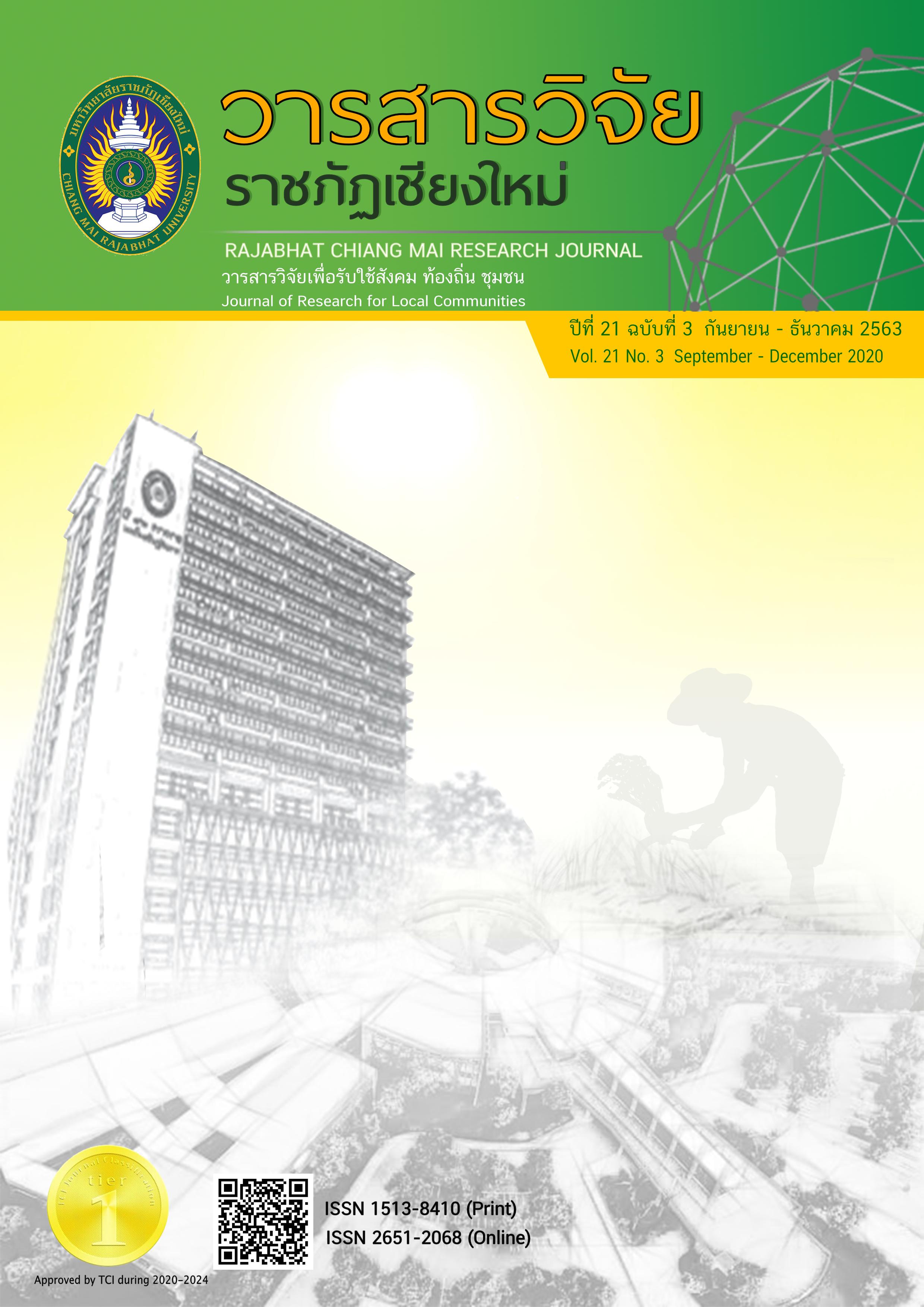Development of Intergenerational Learning Activity Model for Enhancement Local Wisdom Learning of Child and Youth
DOI:
https://doi.org/10.14456/rcmrj.2020.240637Keywords:
Intergenerational learning activity, Local wisdom learning, Children and youthAbstract
This research and development aimed to develop and examine result of the Intergenerational learning activity to promote local wisdom learning for Child and Youth. This study is divided into two phases, the first is development of the Intergenerational learning activity by studying problems and needs from the focus groups of children and youth in all 6 regions of Thailand, interviewing wisdom experts by using a semi-structured interview, and collecting data for drafting a model of Intergenerational learning activity for approval by the experts. The second phase is studying of result of the Intergenerational learning activity to promote local wisdom learning by testing on Tung Samor Community, Phanom Tuan District, Kanchanaburi Province. Result is obtained from self-assessment form for local wisdom learning, comparison between pretest and posttest learning scores, and examination of development scores in knowledge, skills and attitude related with local wisdom learning by analyzing the data which were frequency and percentage.
The result shows that: The components of Intergenerational learning activity Model to promote local wisdom learning for Child and Youth which were accurate and appropriate consists of 8 components: 1) Concept and principle, 2) Goal and expectation, 3) local wisdom learning promotion guideline, 4) model of experience in local wisdom learning, 5) Learning manager, 6) learning space, 7) network and 8) media/learning resources. After the experiment, the result shows that: the children and youth have improvement in knowledge, skills and attitude compared to before the test, and have improvement in all aspects of development.
Downloads
References
Bloom, B., Englehart, M. Furst, E., Hill, W., & Krathwohl, D. (1956). Taxonomy of educational objectives: The classification of educational goals. Handbook I: Cognitive domain. New York: Longmans Green.
Charles, E. O. (1971). Nature of Communication Between Humans. The Process Communication. New York: Harper & Row.
Jitwilai, J. (2017). Effects on the elderly –youth relationship of organizing a local wisdom based on non-formal education process. (Master of Education Program in Non-Formal Education, Faculty of Education Chulalongkorn University). (In Thai)
International Conference on Intergenerational Programs. (1999). The First ICIP International Intergeneration Conference: Connecting Generations a Global Perspective Conference Report. London: The UNESCO Institute of Education and The Beth Johnson Foundation.
Kaplan, M., Kusano, A., Tsuji, I., & Hisamichi, S. (1998). Intergenerational Programs Support for Children, Youth and Elders in Japan. New York: State University of New York Press.
Knowles, M. (1975). Andragogy in Action. San Francisco: Jossey Bass.
Kotchasee, K., & Anukulyudhathon, E. (2019). Dimension application of public space and role of traditional community in Chiang Mai City. Rajabhat Chiang Mai Research Journal, 20(1), 5-18. (In Thai)
Leone, S. (2013). Characterisation of a Personal Learning Environment as a Lifelong Learning Tool. New York: Springer.
Office of the National Education Commission. (1998). Guidelines for promoting Thai wisdom in education management. Bangkok: Pimdee. (In Thai)
Ruangsuwan, C. (2009). Teaching Technology: Design and Development. Bangkok: Odia Store. (In Thai)
Sajjasopon, R. (2016). The intergenerational learning activities based on local wisdom: lesson learned from Bann Huay Sapan Samakee Community, Kanchanaburi Province. Nakorn Pathom: Faculty of Education and Development Sciences, Kasetsart University. (In Thai)
Sinthopphan, A. (2015). Local wisdom. Phatum Thani: S Charoen Printing Co., Ltd. (In Thai)
Sirasunthon, P. (2009). Community of practice (COP): Concepts, techniques and process. Bangkok: Chulalongkorn University Press. (In Thai)
Youth Network inherits the wisdom. (2015). Open the world of youth to carry on the wisdom. Bangkok: Thai Health Promotion Foundation. (In Thai)
Downloads
Published
How to Cite
Issue
Section
License
1. Articles, information, content, images, etc published in the “Community and Social Development Journal” are copyrighted by the Community and Social Development Journal, Chiang Mai Rajabhat University. In order to properly distribute the articles through print and electronic media, the authors still hold the copyright for the published articles under the Creative Commons Attribution (CC BY) license, which allows the re-distribution of the articles in other sources. References must be made to the articles in the journal. The authors are responsible for requesting permission to reproduce copyrighted content from other sources.
2. The content of the articles appearing in the journal is the direct responsibility of the article authors. The editorial board of the journal does not necessarily agree with or share any responsibility.














